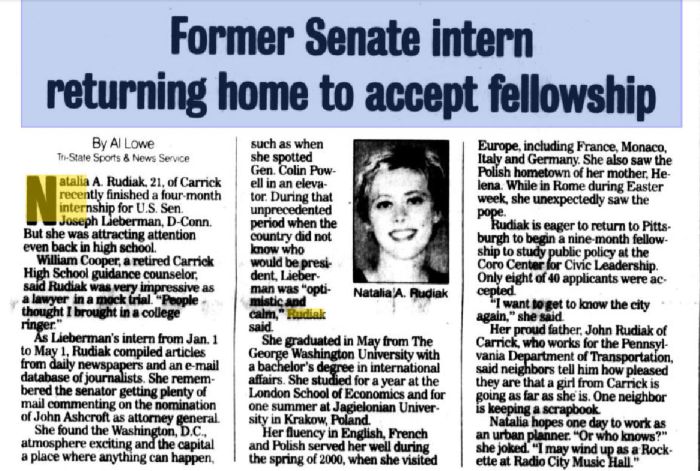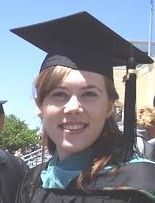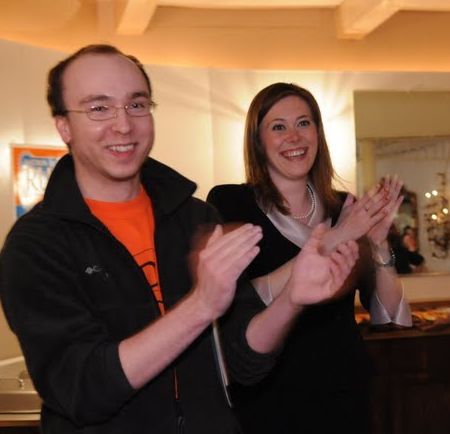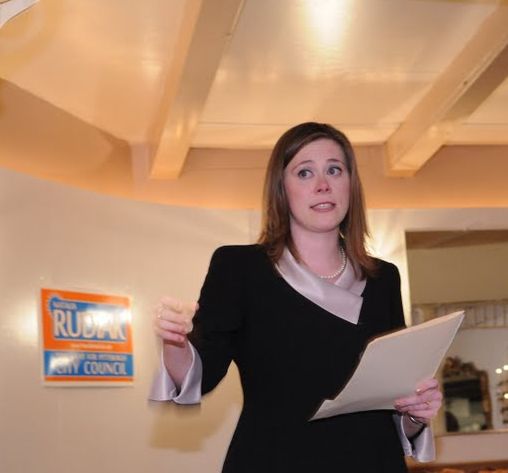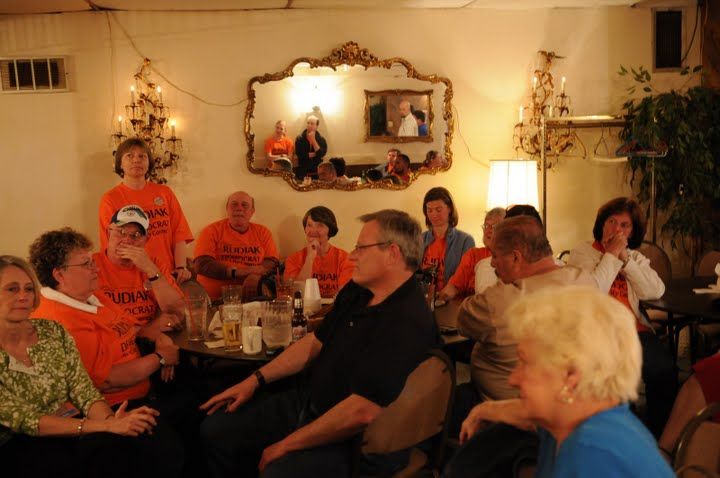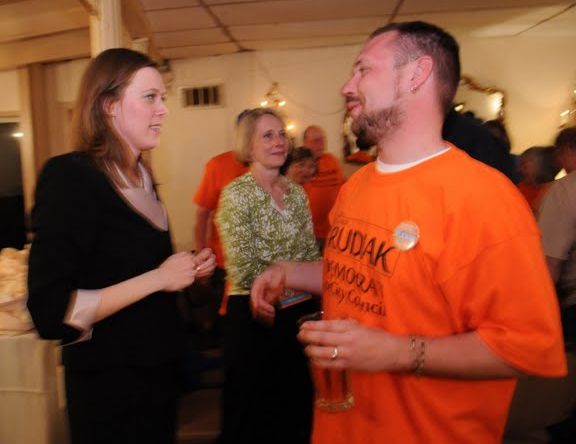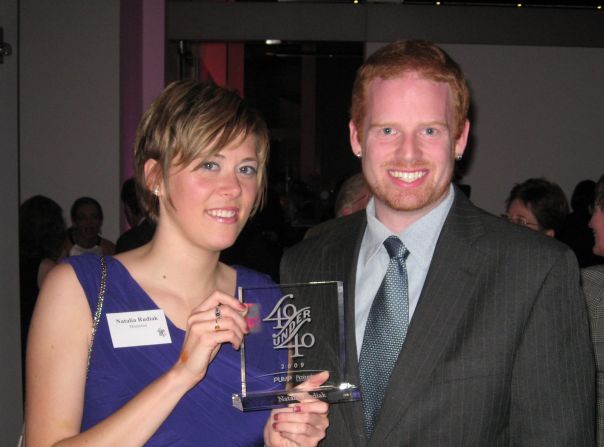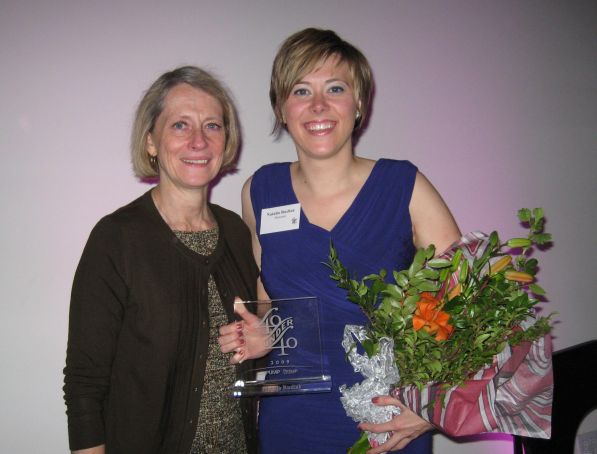Rudiak, Natalia A
Contents
- 1 Natalia Rudiak attended Concord Elementary School, Sterrett Classical Academy and Carrick High School. In 1997 she was named Carrick High School's Senior of the year.
- 2 In 1996, Natalia was awarded the American Federation of State, County and Municipal Employees (AFSCME) International 1996 Family Scholarship.
- 3 After graduating from Carrick High School in 1997 she attended George Washington University and in her Junior year (2000) attended the London School of Economics in London, England. Natalia graduated with a George Washington University BS degree in International Studies in 2001.
- 4 During her Senior year she interned for Senator Joseph Lieberman:
- 5 After her Coro Fellowship she spent a year organizing a symposium for an international womens group in Malasia and spent several months in Dakar, Senegal teaching English.
- 6 Pittsburgh Post-Gazette Article
- 7 Carrick resident wins Heinz School award
- 8 Franco Harris and Natalia at a recent 2008 Generation Obama event
- 9 Natalia announces her campaign for District 4 City Council
- 10 Youtube video
- 11 Natalia addresses issues in District 4
- 12 Youtube video
- 13 Natalia's campaign video for City Council District 4
- 14 Youtube video
- 15 Pittsburgh Post Gazette Endorsement
- 16 Rudiak in District 4: She's the Democrats' strongest choice for council
- 17 Read more Click Here
- 18 Natalia's Victory Speech, May 19, 2009. Natalia Rudiak becomes the first female City Councilwoman of District 4 and the first Councilperson from Carrick.
- 19 Youtube video
- 20 John Fournier, Campaign Manager, and Natalia on Primary Election Victory Night
- 21 Natalia thanks all who contributed their time and efforts.
- 22 The Victory Room Crowd
- 23 The Victory Room Crowd
- 24 Neighbors, friends and relatives join in the Victory
- 25 Natalia and Pete Schmidt, Campaign Assistant Staff
- 26 Political newcomer Rudiak brings fresh voice to Pittsburgh council
- 27 By Jeremy Boren
- 28 TRIBUNE-REVIEW
- 29 Monday, June 15, 2009
- 30 Pittsburgh Tribune Review Article
- 31 November 3, 2009 General Election vote - 5,209
- 32 40 Under 40
- 33 Pittsburgh Magazine Article November 2009
- 34 By Jonathan Wander
- 35 This is the official Proclamation by the City of Pittsburgh City Council honoring the recipients of the 2009 award.
- 36 John (Father), Natalia, and Helena (mother)
- 37 Natalia and Matt Merriman-Preston, Campaign Manager
- 38 Dr. Barbara Rudiak, Aunt, and Natalia
- 39 Natalia Takes Office!
- 40 January 4, 2010, City Council Chambers, Natalia becomes the first female Counciperson of District 4
- 41 Full Text of Inaugural Remarks:
- 42 Read More Click Here
- 43 Showing off the South Hills
- 44 New councilwoman pledges to be an advocate for often-overlooked city neighborhoods
- 45 Pittsburgh councilwoman to meet Friday with Obama
- 46 Read more: click here
- 47 Rudiak in District 4: City Dems have no need to change on council
- 48 Read More Click Here
- 49 Pittsburgh Councilwoman Rudiak plans bill mandating baby-changing stations in all city-owned restrooms
- 50 Read More Click Here
- 51 Rudiak and Gilman: Two Pittsburgh city council pros deserve the voters' support
- 52 Pittsburgh Post-Gazette Endorses Natalia Rudiak Second City Council Term read more
- 53 Open city: Rudiak’s ordinance promises a wealth of data
- 54 Read More click here
- 55 Pittsburgh's pre-K promise
- 56 Give all the city’s kids access to high-quality early-childhood education, urges city councilwoman NATALIA RUDIAK
- 57 The Baby Pittsburgh Promise: Rudiak wants to give all Pittsburghers access to pre-K education
- 58 [Read More ]
Natalia Rudiak attended Concord Elementary School, Sterrett Classical Academy and Carrick High School. In 1997 she was named Carrick High School's Senior of the year.
In 1996, Natalia was awarded the American Federation of State, County and Municipal Employees (AFSCME) International 1996 Family Scholarship.
After graduating from Carrick High School in 1997 she attended George Washington University and in her Junior year (2000) attended the London School of Economics in London, England. Natalia graduated with a George Washington University BS degree in International Studies in 2001.
During her Senior year she interned for Senator Joseph Lieberman:
Pittsburgh Post-Gazette - Aug 8, 2001
After her Coro Fellowship she spent a year organizing a symposium for an international womens group in Malasia and spent several months in Dakar, Senegal teaching English.
Pittsburgh Post-Gazette Article
The Gap Year: More students broaden their experience of the world Sunday, June 03, 2007
By Mackenzie Carpenter, Pittsburgh Post-Gazette
Go sea kayaking in the Sea of Cortez, picking up leadership skills along the way. Explore historic villages on the Germany-Poland border while becoming fluent in German. Soak up Japanese traditions for a year while teaching English as a second language, or live in Senegal, West Africa, learning about Muslim culture.
We're not parroting a travel brochure here, just listing how several recent Pittsburgh-area high school graduates spent the year between high school and college -- or, in one case, the year after graduating from college and plunging into the job market -- as a way of figuring out what to do with their lives.
The British call it the "gap year," and while it's been a staple of upper-class life in that country -- Prince William spent a year in the Army in Belize and volunteering in southern Chile; Prince Harry spent his in Australia and then in Africa, where he worked in an orphanage. And within the Jewish community, Israel is a frequent destination after high school and before college.
Today, though, more and more students in the United States across the socio-economic spectrum are opting to take a break from the competitive treadmill of their high school years to travel, volunteer or work before entering college. Some of them use the time to burnish their resumes so they can reapply to a college that might have rejected them previously, while others want to immerse themselves in another culture altogether. Others need to make money, and still others just want time to think.
While no statistics are available, colleges are seeing signs of a definite trend.
"Are there more students taking a year off first today than a decade ago? Yes," said Betsy Porter, director of admissions at the University of Pittsburgh. Students today "have more acceptable options, places to go, things to do that provide real value, and in some ways, the world has opened up even to 17- and 18-year-olds."
Ben Schweers, 22, explored the Mexican wilderness for three months in a program run by the National Outdoor Leadership School, which uses outdoor activities to teach leadership skills. After graduating at the top of his class at Mt. Lebanon High School, Mr. Schweers had found himself spending the first two or three days at Ohio's College of Wooster in the fall of 2002 "wondering why I was there. It wasn't that Wooster wasn't the place for me, but college wasn't where I thought I should be."
Luckily, his parents were understanding, so after returning home, getting a job in a clothing store and volunteer coaching at his old high school, he enrolled in the outdoor leadership program, which was "life-changing" for him, said his mother, Merrily Schweers.
Besides fueling his interest in the environment, the rigorous but structured program, which included hiking, kayaking and sailing in Mexico's wilderness, allowed Mr. Schweers to hone his ability to lead small groups of people -- skills he'd never really had a chance to show in a classroom.
Another local student, Jacob Bryant of Highland Park, spent a summer in Japan before his senior year at Schenley High School and, then, after being accepted at Harvard, realized he wasn't ready to go to college.
Harvard didn't necessarily expect him to be ready, either: It sent him a response card that asked if he wanted to matriculate in fall of 2002 or the fall of 2003. Mr. Bryant returned to Japan for a year to teach English as a second language at a church-based school before heading to Cambridge, Mass.
It was an experience he wouldn't have traded for anything. Besides learning Japanese, which he'd studied since his middle school days at Frick International Studies Academy, "Personally, it made me more able to handle strange situations. I think if more college students had a broader perspective on the world and an eagerness to connect, that might be a healthy thing."
Gap years can be expensive, running as much as $10,000 to $12,000, along with extras like health insurance, immunizations and other medical costs.
But it's not an option only for the affluent. Mr. Bryant financed the trip himself by sending out fund-raising letters to members of his church, Bellefield Presbyterian, and raised $5,500 -- of which he spent only $3,500 by sharing living quarters in Yokohama (he donated the remainder of his money to the Japanese church). "It was not a glamorous life," he laughed. "I worked really hard, and I was kind of writing my own curriculum and teaching it at the same time."
Sometimes, the gap year comes after graduating from college and before choosing a career, as in the case of Natalia Rudiak, 27. A graduate of Carrick High School, Ms. Rudiak hit the ground running as a freshman at George Washington University, but after graduating in 2001, "I couldn't decide what I wanted to do."
After a nine-month public policy fellowship with the Coro Center for Civic Leadership in its Pittsburgh office, she went to New York City for a year to work for an international women's health organization.
Then, she went to live in Senegal for eight months.
"It was always something I wanted to do," Ms. Rudiak said. "When I was in college, I was around a lot of people who had lived in other countries, and I wanted to try it but wasn't sure what the focus should be."
After doing some research, she discovered a program that placed Americans as English teachers overseas and, after raising $2,500 from family and friends, soon found herself in West Africa as a teacher's assistant in a Senegalese American bilingual school.
"I wanted to work in international development, but while I was there, shortly after 9/11, I had an epiphany. I realized that if I wanted to make changes in the world, I'd have to contribute to making changes at home first," said Ms. Rudiak, who went on to get her graduate degree from the Heinz School of Public Policy at Carnegie Mellon University and is currently working at Deloitte Consulting LLP.
She also noted that while studying abroad her junior year at the London School of Economics, "almost everyone had done a gap year or something like that. Even my roommate, who came from a blue-collar background, managed to scrape some money together and travel around India before going back to school."
Still, taking time off has its pitfalls, Mr. Bryant noted. After a year spent in the real world, that "made it harder to go back into academia. At Harvard, I felt like I was out of the rhythm of studying, so maybe, for some people, there is something valuable about going right into college."
Indeed, noted Ms. Porter, a "gap year" is "not a universal answer for every student. Some kids are just emotionally ready to move from high school to college, and like to move in lockstep with the friends they make their freshman year."
There haven't been a lot of studies on the impact of delaying entry into college, but in the 1990s, researchers at the National Center for Education Statistics found it can decrease a student's chances of completing a degree.
But Holly Bull, who heads the Center for Interim Programs, a consulting service that helped place Mr. Schweers and other students in "gap year" programs, said that there are just as many studies showing that recent high school graduates need more time to mature.
"It's a feverish process getting into college and when they do get in, they often don't have a sense of what to focus on," she said, adding that often "what you see the first year in college are kids floundering around, changing majors, trying to fit in, drinking. Freshman year can be an expensive party."
Her company, based in Cambridge, Mass., and Princeton, N.J., has access to thousands of unusual programs all over the world, from the healing arts to social services, from volunteering at a Mexican orphanage to construction projects in Tibet.
In Mr. Schweers' case, after coming home to Mt. Lebanon and working a summer job as a landscape assistant, he applied to Skidmore College, where he graduated with a degree in environmental studies several weeks ago. He was recently selected from among more than 1,000 applicants to be one of 25 paid interns with GreenCorps, the nationally acclaimed Field School for Environmental Organizing.
Both he and his parents believe that his experience at an outdoor leadership school played a significant role in determining where he is today.
"It made me more comfortable with that transition into college, which is often very rocky, and made me more comfortable with myself."
First published on June 1, 2007 at 1:04 pm
Mackenzie Carpenter can be reached at mcarpenter@post-gazette.com or 412-263-1949.
As published in the South Pittsburgh Reporter, Sunday, JUL 06, 2008:
Carrick resident wins Heinz School award
Natalia A. Rudiak
On May 21, 2006, the Carnegie Mellon University H. John Heinz III School of Public Policy and Management held the 34th commencement ceremony in Oakland, where Natalia A. Rudiak of Carrick received a Master of Science Degree, with Distinction, in Public Policy and Management (MSPPM).
Ms. Rudiak was nominated by her colleagues to receive the 2006 Barbara Jenkins Award. The award is given in memory of Barbara Jenkins (MS 1987) to a graduating student who has demonstrated service to the Heinz School and made significant contributions to the quality of life for the residents in Pittsburgh.
Her colleagues and professors noted Ms. Rudiak’s involvement in “Run Baby Run,” a campaign to recruit female political candidates in Southwestern Pennsylvania. (According to the DC-based Institute for Women’s Policy Research, Pennsylvania ranks 47th in female political participation among the United States, and until May 2006, the Southwestern Pennsylvania region had no female state representatives.)
She has organized youth-oriented voting initiatives for “Everyone Vote” and the League of Young Voters, as well as several social events and political forums at Carnegie Mellon University. She is also is co-creator of the Website www.iheartpgh.com. In the May 2006 primary election, Ms. Rudiak was elected to the 29th Ward Democratic Committee.
The Heinz School is known internationally for its educational curriculum and research. According to their Website, the school’s purpose is to “understand the causes of critical social problems and to train men and women through masters and doctoral programs to use new knowledge and technology to bring about positive change.”
The program emphasizes economics, statistics, information science, and organizational behavior to study how public policies affect society. Heinz strives to support “intelligent action” in non-profit, public, and private organizations, and counts 5,000 graduates from all over the United States and the world.
In the fall, Ms. Rudiak will begin employment with Deloitte Consulting, where she will work to improve the efficacy and efficiency of public institutions and governments.
She is the daughter of John and Helena Rudiak of Carrick, and the granddaughter of the late Joseph and Regina Rudiak of the South Side, and Lucyna and the late Dionizy Kusiolek of Przyjma, Poland. She plans to stay in Carrick.
Franco Harris and Natalia at a recent 2008 Generation Obama event
Natalia announces her campaign for District 4 City Council
Youtube video
Natalia addresses issues in District 4
Youtube video
Natalia's campaign video for City Council District 4
Youtube video
Pittsburgh Post Gazette Endorsement
Rudiak in District 4: She's the Democrats' strongest choice for council
Wednesday, May 06, 2009 Pittsburgh Post-Gazette
As grudge matches go, the one between Pittsburgh Councilman Jim Motznik and former state Rep. Michael Diven over the district judge seat in the South Hills is a doozy. It is also distracting. Consequently, Mr. Motznik, a two-term incumbent, is not seeking re-election to council.
This means that the race to find a Democratic nominee for the District 4 council seat serving Bon Air, Overbrook, Carrick, Brookline, Beechview and parts of Banksville and Mount Washington is wide open for the first time in years. The three men and one woman competing in the May 19 primary (there is no Republican on the ballot) have qualities that reflect the best of the communities they're striving to represent.
Patrick Reilly, 27, the community outreach coordinator for state Rep. Chelsa Wagner, has the backing of the Allegheny County Democratic Committee. The Overbrook resident is a graduate of Seton-La Salle High School and the University of Pittsburgh, where he majored in communications. He's energetic, smart and understands the value of networking. Like his rivals, Mr. Reilly promises that economic development in the struggling business districts of the South Hills will be his top priority.
Anthony Coghill, 42, a Beechview roofing contractor, is no stranger to the race. This is his third run for the District 4 council seat. He says neighborhood businesses have deteriorated during Mr. Motznik's tenure. An active member of the Beechview Merchants' Association, Mr. Coghill is the founder of one of the largest roofing businesses in Pittsburgh.
At 66, Richard Weaver, a Brookline resident, has seen many council members come and go over the years. He is a city demolition officer who used to do code enforcement for Pittsburgh's building inspection department. Like his colleagues, Mr. Weaver believes reviving business districts and lowering crime are the keys to turning District 4 around.
Natalia Rudiak, 29, of Carrick is well-known as someone who can be found at community meetings throughout the district on any given night. She is active in a half-dozen neighborhood organizations committed to improving the local quality of life.
The self-employed consultant was a Coro leadership fellow and an employee of Deloitte Consulting. Ms. Rudiak is a graduate of Carrick High School and George Washington University. She has a master's in public policy from Carnegie Mellon University and has studied at the London School of Economics.
Ms. Rudiak's candidacy is timely because her academic background is integral to both her community activism and political aspirations. She's combined a natural bent toward public policy with a compassion that keeps her rooted in the community where she grew up.
Because of her background with nonprofits and community groups, Ms. Rudiak is poised to bring about much-needed revival of the business districts. She's comfortable with complexity and understands that District 4 is part of a larger city mosaic. She's progressive, hard-working and temperamentally ready for the rigors of the office.
Thanks to her hard work in District 4, she's won the endorsements of diverse groups representing teachers, environmentalists, government employees and food workers. Add to this list the endorsement of the Pittsburgh Post-Gazette. For District 4 Democrats on May 19, Natalia Rudiak is the best choice hands down.
First published on May 6, 2009 at 12:00 am
Read more Click Here
Natalia's Victory Speech, May 19, 2009. Natalia Rudiak becomes the first female City Councilwoman of District 4 and the first Councilperson from Carrick.
Youtube video
John Fournier, Campaign Manager, and Natalia on Primary Election Victory Night
Natalia thanks all who contributed their time and efforts.
The Victory Room Crowd
The Victory Room Crowd
Neighbors, friends and relatives join in the Victory
Natalia and Pete Schmidt, Campaign Assistant Staff
Political newcomer Rudiak brings fresh voice to Pittsburgh council
By Jeremy Boren
TRIBUNE-REVIEW
Monday, June 15, 2009
Pittsburgh Tribune Review Article
Natalia Rudiak has old-school Pittsburgh roots, but supporters say her politics are nothing of the sort.
"There were a lot of people that said I couldn't do it," said Rudiak, 29, of Carrick, who won a primary race for City Council last month. "I don't know what it was, if it was my age or if it was my gender, but they just kind of looked at me and didn't take me seriously."
Rudiak defeated three other Democrats to replace District 4 City Councilman Jim Motznik, who has been in office since 2001 and is leaving to run for district judge. With no Republican candidate on the November ballot, Rudiak, a graduate of George Washington and Carnegie Mellon universities, is set to become council's youngest member.
Rudiak has worked as a business strategy and operations consultant for Deloitte Consulting in Pittsburgh and Harrisburg; a campaign organizer for the nonprofit Everybody VOTE; a communications assistant for Family Care International in New York; and an English teacher in Dakar, Senegal.
She lives in a three-bedroom, 100-year-old former convent that she spent two years renovating on Brownsville Road.
"I like to think that I actually saved this house from being carved up into different apartments," she said.
When she's not working on the house, Rudiak, a dog-lover, occasionally baby-sits pets for friends. She also plays piano, flute and sax, calling on musical abilities she says came from her grandfather, who played drums in The Seven Rudiak Brothers Orchestra.
A black-and-white photo of drummer Joseph Rudiak sits in the sun room of her home, which is 300 feet from Concord Elementary, where she went to school. Her parents, John and Helena, live a few blocks away.
"It's about time that somebody from this side of Route 51 wins an election and gives us some representation," said Carol Anthony, 67, acting president of the Overbrook Community Council who campaigned for Rudiak. "I wasn't sure someone so independent and fresh-faced could win."
That independence could make for an uneasy political relationship with Mayor Luke Ravenstahl, who said he doesn't know Rudiak well. He supported Anthony Coghill, one of her opponents in the primary. Kevin Acklin, an independent running against Ravenstahl in the November election, supported her campaign.
"I see her as less a politician and more as a young person from the city who wants to give back," said Acklin, who donated $600 to Rudiak's campaign and hired her campaign manager to help direct his mayoral bid.
Judy Demma, 56, of Brookline said she always votes but doesn't get involved in political campaigns. She made an exception for Rudiak, a family friend.
Demma believes Rudiak will work to fill empty storefronts in Brookline and Beechview with businesses and bring a beat cop to patrol Brookline. Her lack of political baggage is an asset, Demma said.
"She doesn't owe anybody anything."
Coghill said he thinks voters saw Rudiak as a political outsider, which helped her in an area tired of partisan bickering. District 4 includes Brookline, Beechview, Overbrook, Carrick and Bon Air.
"She kind of came out of nowhere," said Coghill, who narrowly lost to Motznik in 2005.
Rudiak said she will focus on fulfilling basic constituent services: fixing streets, clearing vacant lots and demolishing condemned buildings. She plans to take a ride in a city plow truck. Her biggest challenge, she said, will be reversing population decline.
"I grew up in this community. A lot of my high school friends have moved away. A lot of family friends have moved away. I see almost a hollowing out of our city," Rudiak said.
November 3, 2009 General Election vote - 5,209
40 Under 40
Pittsburgh Magazine Article November 2009
By Jonathan Wander
Photography by Laura Petrilla
They come from all walks of life, with a diversity of backgrounds, professions and community-service passions that speak to the richness that is young, professional Pittsburgh. This is our 11th annual 40 Under 40, a celebration of 40 inspirational, successful, generous men and women from our region, all under age 40, who represent the best in Pittsburgh's present and future.
Natalia Rudiak » 29 » Management consultant, Civic Capital Consulting Collaborative » Natalia Rudiak is a management consultant with Civic Capital Consulting Collaborative, a group that helps nonprofit organizations and community groups create and implement concrete plans for growth and collaboration. Rudiak, who is a candidate for Pittsburgh City Council, is an active member of South Pittsburgh Neighborhood Forum and has helped individuals and groups share information and work together using technology. She is also a member of the Allegheny County Democratic Committee, vice president of Carrick Community Council, co-founder of the Carrick-Overbrook Historical Society and co-founder of the popular blog IHeartPGH.com (regularly featured on the WDVE "Friday Morning Show").
This is the official Proclamation by the City of Pittsburgh City Council honoring the recipients of the 2009 award.
Click here for City of Pittsburgh Legislation link.
WHEREAS, on November 6, 2009, the 40 Under 40 Awards will be presented by the Pittsburgh Urban Magnet Project (PUMP) and Pittsburgh Magazine; and WHEREAS, PUMP was founded in September 1995 to advance issues affecting young and young-thinking people in the City, and strives to engage the young professional in issues involving attraction and retention of youth in Pittsburgh; and WHEREAS, Pittsburgh Magazine, which began as a local program guide and arts and culture magazine, is now the leading city and regional magazine, focusing on the Pittsburgh region’s lifestyles, arts and culture, fashion, and growth and development; and WHEREAS, for the eleventh year, PUMP and Pittsburgh Magazine will honor the following forty people under the age of forty who are making this region a better place to live:
Khalif Ali
Regina Anderson
Armen Arevian, Ph.D.
Danielle Baco
Erin Baker
Kelly A. Barcic
Charlie Batch
Mary C. Burke, Ph.D.
Carlos T. Carter
Robert Chambers, II
Dana Davis
Jennifer DeFazio
Victor Dozzi, Jr.
Matthew Erb
Cara Erskine
Rachel Filippini
Marissa Gallagher
Dennis Geary
Deborah Gilboa, M.D.
Tyra Good
Bob Grayson
Justin Gunther
Daisy Klaber
Robert Daniel Lavelle
Felix Brandon Lloyd
Allyson Lowe, Ph.D.
Mayada Mansour
Sylvia McCoy
Piyush Seth
Jason W. Ross
Natalia Rudiak
Luke Skurman
Janera Solomon
Heather Starr Fiedler, Ph.D.
Melissa Swauger, Ph.D.
Steven M. Toprani
Kristy Trautmann
Stephanie P. Walker
Robert Wilson
Barrett Ivory Wood, M.D.
NOW, THEREFORE, BE IT RESOLVED, that the Council of the City of Pittsburgh hereby commends and thanks PUMP and Pittsburgh Magazine and congratulates the recipients of the 40 under 40 awards; and
BE IT FURTHER RESOLVED, that the Council of the City of Pittsburgh hereby declares November 6, 2009 “40 Under 40 Day” in the City of Pittsburgh.
SPONSORED BY COUNCILMAN WILLIAM PEDUTO
CO-SPONSORED BY COUNCIL PRESIDENT DOUGLAS SHIELDS AND COUNCILMEMBERS REV. RICKY V. BURGESS, PATRICK DOWD, DARLENE M. HARRIS, BRUCE A. KRAUS, JIM MOTZNIK, TONYA D. PAYNE AND THERESA KAIL-SMITH
John (Father), Natalia, and Helena (mother)
Natalia and Matt Merriman-Preston, Campaign Manager
Dr. Barbara Rudiak, Aunt, and Natalia
Natalia Takes Office!
January 4, 2010, City Council Chambers, Natalia becomes the first female Counciperson of District 4
Pittsburgh City Councilmember Natalia Rudiak was officially sworn in today at a ceremony in Council Chambers. In an uplifting inaugural address, she called for a civic re-awakening in Pittsburgh to aide revitalization in the neighborhoods.
Citing the tough economic times that have gripped the nation and her campaign commitment to bring more investments to Pittsburgh’s Southern neighborhoods, Rudiak asked her fellow Councilmembers to, “tackle these issues with a zeal that is unmatched and a vigor that is unparalleled.”
Councilmember Rudiak, drawing on her own experience as a community leader in district 4, also called on Pittsburghers to get more involved by “[interfacing] with City government, so we all can take ownership of it and start organizing for our communities.”
She continued:
All across this country, big cities are hurting too, just like Pittsburgh. Cuts in state revenue, crumbling infrastructure, neighborhood de-stabilization—these are national problems. But the City who solves them first will become America’s next great urban center—our nation’s next great story of renewal, of change, and of hope. And so, we must tackle these issues with a zeal that is unmatched and a vigor that is unparalleled.
Councilmember Rudiak was elected after capturing more than 98% of the vote in the November general election. In May, the Carrick Democrat won a three way primary to secure her party’s nomination. A graduate of George Washington University, Councilmember Rudiak holds a masters degree in public policy and management from Carnegie Mellon University. Prior to her election, she was an active community leader and business owner in the Pittsburgh’s southern neighborhoods.
Full Text of Inaugural Remarks:
A Call to Action: Councilmember Natalia Rudiak Inaugural Remarks
Today, the City of Pittsburgh, as it does every two years, begins a new journey with new leadership on deck and a new course for our future. For me, this journey began more than a year and a half ago, with an empty campaign account, a few volunteers, and a lot of determination.
But it really began with my family. My parents, Helena and John, my Aunt Barbara Rudiak and my Uncle Mike Rudiak. You have always supported me, but your commitment to me, to the campaign, and to the City of Pittsburgh blew everyone away and I cannot imagine having done this without you. Thank you so much.
I also want to thank the members of my family who couldn’t be here today. For those of you who don’t know, my mother is from Poland, she was born there. My grandmother, who is 79 years old today, barely finished second grade before our family’s village was occupied by the Nazis and she was forced to drop out of school. She could never imagine, and still cannot fathom, that her granddaughter is standing here, as the first woman elected to represent Pittsburgh City Council District 4. And although my family is an ocean away, I know that they are with us in spirit.
In many ways, my family embodies the essential Pittsburgh story—we came from far away, looking for a new life and new opportunities. We struggled to work and save and make ends meet, toiled in the steel mills and the coal mines of Pennsylvania, and built this city from the ground up, always thinking of our children, and our children’s children.
My loved ones, and the experiences and values they have instilled in me are my compass, they are my guide through tough times, and they have given me the incredible foundation and support that have brought me here today.
I love you all, and I thank you so very much. I am blessed.
I also want to thank my staff for their hard work over the last year, and all of those who supported me including the SEIU, UFCW, Laborers, PFT, the Sierra Club, Stonewall Democrats, Young Democrats and many more…you know who you are and I thank you!
I want to thank all of the members of Council for your gracious advice and support during my transition. I have spoken with each one of you, and your guidance has been invaluable to me and my staff during this time. It has been support that I will not soon forget, and I thank you.
To Mayor Ravenstahl, the local delegation to the Pennsylvania Legislature, our County wide elected officials, and the invaluable City workers—from department directors all the way to road crews—I have enjoyed working with you through my time as a community leader and councilmember in transition and I look forward to working closely with you in the future.
On the campaign, we started small, but dreamt big. From our tiny office in Brookline, we knocked on doors for hours every day, through the bitter Pittsburgh winter and into the rainy spring. I met thousands of my neighbors, and I learned so much about the communities where I grew up, and where I call home.
The gift that my neighbors gave me was the peace of mind and clarity of purpose to help lead Pittsburgh into a new future, filled with opportunities for every Pittsburgher to grow and succeed.
I will carry this gift with me every day as your District 4 Council Member. And in return, I promise to continue the conversations that begin on the front porch to the Fifth Floor here on Grant Street. I will try to inspire YOU. I will ask you to be involved—to pick up a broom and work in your neighborhood, to organize your neighbors, and come down to this very chamber and hold our feet to the fire.
I ask you to BE INSPIRED and to build a better Pittsburgh with me!
There are countless stories from the campaign of people who stepped up and decided to make a difference for our communities. But one in particular stands out. One day, a man walked in to the campaign office and just wanted some information on my candidacy. His name was Jack. I talked to him for a little while, and he told me that while he no longer lives in Pittsburgh, he ran a community-oriented non-profit. So I asked if he wanted to volunteer with us—and after talking to me, he did. And he came back, again and again, especially in the closing weeks of the campaign.
What I said to Jack is what I have said to so many of my friends and neighbors over the last two years: I asked him to be a partner with our City, to be a Pittsburgher once again, and to be inspired to ask more of our political leadership and of our community.
I had coffee with Jack a few weeks ago, and I was surprised to learn that he was so inspired by that message, and by our campaign, that he mounted a grassroots campaign of his own. And I am pleased to say that on November 5th, the Borough of Carnegie elected a great new Mayor in Jack Kobistek, and the City of Pittsburgh gained a great new partner in the effort for regional cooperation.
I am asking people like Mayor Kobistek to be inspired to ask more of our leadership and our communities. And now is the time to step up and be heard—we are coming off of elections where only a small fraction of Pittsburghers showed up to vote. It’s unfortunate, but we have no one to blame but ourselves. By keeping their votes in their pockets, the people of Pittsburgh have sent us a powerful message—that we must do better.
We must do a better job of attracting new businesses and new opportunities. We must do a better job of tearing down abandoned housing and protecting our neighborhoods from crime and neglect. We must do a better job of showing people how to interface with City government, so we all can take ownership of it and start organizing for our communities.
This is our challenge: To build a better Pittsburgh house by house, street by street, and block by block. It will not be easy…this hard work will not be done in one week, or one year, or one term in office, but it must be done for our City and for our future.
We have received lavish praise from the national media for the progress we have made, there is no doubt about it. But people are still voting with their feet and moving out of our City, and we must fight this epidemic with every ounce of our spirit. We must be a city that is not just praised by Forbes Magazine, but is cherished by the sons and daughters of the great men and women who built this city with their bare hands and wrought determination.
All across this nation, Americans are struggling. The job losses have been staggering, and foreclosures unbearable. It’s important to remember that this economic climate has beat down so many American workers. How many families have been displaced? How many parents have lost their jobs? What were the holidays like this year for our neighbors … or even ourselves?
All across this country, big cities are hurting too, just like Pittsburgh. Cuts in state revenue, crumbling infrastructure, neighborhood de-stabilization—these are national problems. But the City who solves them first will become America’s next great urban center—our nation’s next great story of renewal, of change, and of hope. And so, we must tackle these issues with a zeal that is unmatched and a vigor that is unparalleled.
Pittsburgh needs a re-awakening—and all of us here today must lead it!
So when we talk about bringing investment to our neighborhoods, let us not forget the Pittsburgh families who will benefit. Because it’s Pittsburghers who will build the buildings and pave the roads — it’s Pittsburghers who will clean the offices and provide service to our guests – it’s Pittsburghers who will come home from a hard days’ work with food to put on the table and a heated house in which to tuck their children in at night.
When we talk about public safety, we aren’t just talking about abstract statistics and pie charts. We are talking about building healthy and attractive neighborhoods where families can settle and grow. Places that will offer stability and safety so children can navigate the challenging adolescent worlds of school and social life without also having to navigate the cultures of gang violence and drugs.
When we talk about our parks, we aren’t just talking about patches of grass, but real investments that make our neighborhoods fun destinations for young families. These are investments that will increase our tax revenue and give children a safe place to play.
When we talk about transparency, it’s not some pawn in a gotcha game of politics. It’s a way to give Pittsburghers information about how our government works, so we can take ownership of our communities and work to bring investments and change on our own.
Let us move forward with this new council, with this charge to build a better Pittsburgh house by house, street by street, and block by block. Let us work to inspire our friends and our neighbors to build this City up and make it America’s next great story of renewal and hope. But above all, let us work together, as a united council, to bring the investments to our neighborhoods that we deserve.
Thank you.
Read More Click Here
Showing off the South Hills
New councilwoman pledges to be an advocate for often-overlooked city neighborhoods
Monday, January 04, 2010
By Rich Lord, Pittsburgh Post-Gazette
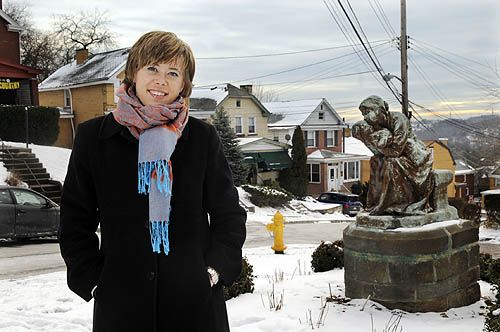 Bill Wade/Post-Gazette
Natalia Rudiak, 30, in her Carrick neighborhood, joins Pittsburgh City Council in January. The mother and child sculpture "L'Enfant" by Roger Bloche is landmark at Overbrook Boulevard and Ravilla Street.
Bill Wade/Post-Gazette
Natalia Rudiak, 30, in her Carrick neighborhood, joins Pittsburgh City Council in January. The mother and child sculpture "L'Enfant" by Roger Bloche is landmark at Overbrook Boulevard and Ravilla Street.
When Natalia Rudiak tells people which neighborhoods she will represent on City Council, they sometimes express surprise that Carrick, Overbrook, Brookline, Beechview and Bon Air are parts of Pittsburgh.
One of the top priorities of the 30-year-old Carrick resident, who joins council today, is getting this message across: The South Hills neighborhoods are part of the city; they have needs; and they deserve attention.
"In order for us to get more resources from the city, or foundations, or nonprofits, these organizations need to know that we exist," Ms. Rudiak said last week. "Every single time I sit down and meet with someone, I'm acting as an ambassador to those organizations from our neighborhoods."
She replaces Jim Motznik, who focused on constituent services during his nine years on council, and has moved on to the district judge seat in Brookline. She, too, intends to concentrate on helping residents but also intends to pick up the pace in terms of development in a district that is largely southwest of Route 51.
Route 51, she said, "is a mess, and there have been so many studies done on that." Since her victory in the May primary, she's been collecting and reading those studies in an effort to figure out what the city can do along the dowdy four-lane road, as well as in the Brookline, Beechview and Carrick business districts that sit on the hills above it.
"If there's one thing I hate in life, it's reinventing the wheel," she said. So she's studying existing multi-neighborhood groups like the Baum-Centre Planning Initiative, and trying to plug more of her constituents into citywide organizations like the Pittsburgh Community Reinvestment Group and A+ Schools.
A big part of her job will be addressing the perception that the south gets the shaft from the city.
"Your city hall has to have a sense of urgency about what you want, and I just don't think that the southern neighborhoods really have been on their radar," said Keith Knecht, vice president of the South Pittsburgh Development Corp. "She's a bright person. She's very sincere. I don't know how she'll fare in the morass that we call City Council, but I hope that she can maintain her integrity and bring us some higher profile in terms of our contribution to the city."
She has built a good relationship with state Rep. Chelsa Wagner, who just got state funding for a community developer who will split time between Brookline and Beechview. Ms. Wagner believes the southern communities have suffered from being in-between neighborhoods -- not troubled enough to qualify for federal funds and other intensive care, and not well-off enough to throw their weight around.
Ms. Rudiak was a self-employed consultant working with nonprofit groups before winning a four-candidate Democratic primary and an uncontested general election. After the primary she phased out her work and has focused on studying everything from bike racks to tax policy.
She campaigned against "soap opera politics" while besting two South Hills political factions in the primary. Now she enters a council whose recent meetings have been daytime dramas, especially in the run-up to today's vote for the body's presidency.
She wouldn't say how she'll vote in that contest, which has pitted Councilmen William Peduto and Ricky Burgess against each other, but could easily have a surprise ending that would put Theresa Smith, Darlene Harris, Bruce Kraus, Patrick Dowd or incumbent Doug Shields in the big chair.
"It's just like any other new job -- you have to learn different peoples' personalities," she said. "I hope that I can bring a tone of rationality to any situation."
Rich Lord can be reached at rlord@post-gazette.com or 412-263-1542.
Pittsburgh councilwoman to meet Friday with Obama
Wednesday, June 15, 2011
Pittsburgh Post-Gazette
Pittsburgh City Councilwoman Natalia Rudiak will meet with President Barack Obama and other administration officials Friday in Washington, D.C.
Ms. Rudiak, who's in her first term, was invited as part of a delegation from the American Way Foundation's Young Elected Officials Network.
She said she plans to speak about federal funding cuts, public safety and community development issues.
"The president has been a steadfast ally of cities in America, but our main streets need help and Republicans in Congress have done nothing but force cut after cut to cities like Pittsburgh," Ms. Rudiak said in a statement. "We've seen cuts to programs that help Pittsburgh with our police protection, street paving, building demolition, youth job programs, economic development, the capital budget and much more, and I'm looking forward to speaking with the president about how we can restore these programs."
First published on June 15, 2011 at 11:50 am
Read more: click here
Rudiak in District 4: City Dems have no need to change on council
May 8, 2013 12:00 AM
Pittsburgh Post-Gazette Johnny Lee, who is challenging Pittsburgh Councilwoman Natalia Rudiak for the District 4 Democratic nomination in the May 21 primary, has what is considered the trifecta of endorsements for a city election -- the Fraternal Order of Police, the Pittsburgh Fire Fighters Local 1 and the city Democratic committee.
What Mr. Lee did not articulate during a meeting with Post-Gazette editors was a good reason to replace Ms. Rudiak as the party's choice to run for the seat, which represents Beechview, Brookline, Bon Air, Carrick, Overbrook and a small part of Mount Washington. The Democratic nominee will face Republican Samuel J. Hurst, who is unopposed in the primary.
Mr. Lee barely criticized Councilwoman Rudiak, calling her a competent opponent. A difference between them is Mr. Lee supports getting the city out from the state oversight of Act 47 "sooner than later," while Ms. Rudiak believes, as the Post-Gazette does, that, although the city has made improvements, major elements of its recovery plan remain undone, making continued oversight important.
Mr. Lee, 52, of Brookline, recently retired as a U.S. Postal Service supervisor but he is best known for his 18 years as a high school basketball coach and as a broadcaster for the local MSA Sports radio network. He describes himself as a people person who would be better able than Ms. Rudiak to reach out to the district's elderly residents and who would concentrate on community quality-of-life concerns rather than broad, citywide issues.
During her four years on the job, Ms. Rudiak, 33, of Carrick, seems to have tackled both.
The South Hills district, which long has believed it's been neglected compared to services provided in the city's East End communities, is seeing a lot of neighborhood attention right now. A new, $3 million Beechview community center is being planned. Brookline's commercial core, Brookline Boulevard, is undergoing a complete reconstruction. Carrick and Overbrook have joined Economic Development South, a group that works along the Route 51 corridor that those neighborhoods share with nearby suburbs.
Citywide, Ms. Rudiak has not been afraid to confront the status quo, leading a task force that was set up to review emergency response plans for weather emergencies after a 2010 blizzard crippled Pittsburgh.
Like Mr. Lee, we can't articulate a good reason for him to replace her as the Democratic nominee. The Post-Gazette endorses Natalia Rudiak -- a smart and effective hard worker.
Read More Click Here
Pittsburgh Councilwoman Rudiak plans bill mandating baby-changing stations in all city-owned restrooms
By Moriah Balingit Pittsburgh Post-Gazette Pittsburgh City Councilwoman Natalia Rudiak plans to introduce legislation today requiring baby-changing stations in the bathrooms of city-owned buildings, including senior centers, pools, recreation centers and the City-County Building.
Ms. Rudiak's bill would require the stations in both men and women's restrooms.
In a press release, Ms. Rudiak said that while the stations are common in women's restrooms, they're often absent from men's restrooms, making it difficult for fathers and male guardians to care for their children.
"Modern families require modern amenities," she said int he release. "Parenting responsibilities are more equally shared than ever before, and it's time that our public buildings catch up to that trend."
Read More Click Here
Rudiak and Gilman: Two Pittsburgh city council pros deserve the voters' support
October 15, 2013 12:00 AM
Pittsburgh Post-Gazette
This is the first in a series of candidate endorsements in contested races on the Nov. 5 ballot. These editorials will culminate in a recap of the Post-Gazette's recommendations that will appear on Sunday, Nov. 3.
Vigorous contests in two Pittsburgh council districts during the Democratic primary have given way to quieter fall campaigns for next month's general election. The choices should be easy ones for voters, with two council veterans -- one an incumbent and the other a longtime staff member -- having ideas and experience that are superior to that of their challengers.
•
Natalia Rudiak, who joined council in 2010, is seeking her second term in District 4, and her active tenure recommends her for it. After defeating a candidate who had powerful union backing and the Democratic committee's endorsement in the primary, she squares off against an energetic but less-prepared Republican challenger.
Ms. Rudiak, 33, of Carrick, holds degrees from George Washington and Carnegie Mellon universities. She has actively solicited business owners, developers and philanthropic leaders to invest in the communities that make up District 4 -- Beechview, Bon Air, Brookline, Carrick, Overbrook and part of Mount Washington.
She has tackled projects both big and small in her district at the same time that she has been an advocate on important citywide issues. An ally of mayor-apparent Bill Peduto, she said she is looking forward to tackling some of the city's problems working in tandem with his administration.
The Post-Gazette endorses Natalia Rudiak for re-election.
Pittsburgh Post-Gazette Endorses Natalia Rudiak Second City Council Term read more
Open city: Rudiak’s ordinance promises a wealth of data
January 15, 2014 8:11 PM
The Pittsburgh Post-Gazette
Pittsburgh Councilwoman Natalia Rudiak has proposed the digital equivalent of opening all the doors and windows of city government offices.
Her breath of fresh air is a proposed ordinance that would transform promises of transparency in government into a practice giving citizens easy access to information. If approved by council and signed by Mayor Bill Peduto, who favors it, the “open data” ordinance would lead to a new city website containing a wealth of data.
Laura Meixell, appointed by Mr. Peduto as Pittsburgh’s first data and analytics manager, would create the site, and every city department would have a coordinator responsible for producing an inventory of information for display.
All records considered public under the state’s Right to Know Law could be available online, eliminating red tape. Once it is in operation, citizens and businesses would be able to find everything from the location of reported potholes to paving schedules, from building permit applications to budgets.
This proactive approach is more than a tool for residents. Mr. Peduto wants the city to better utilize the data in-house to measure how departments are performing and to figure out new ways to efficiently get jobs done. Proponents also hope that outside technology developers eventually will create tools like one devised for Chicago, which allows residents to track snowplows during a storm so they can pick clear routes for driving.
All of that potential starts with the ordinance’s underlying premise that citizens have a right to “prompt, efficient service” and that “it should be easy to do business with the City of Pittsburgh.”
City council should not waste any time approving this forward-thinking measure.
Read More click here
Pittsburgh's pre-K promise
Give all the city’s kids access to high-quality early-childhood education, urges city councilwoman NATALIA RUDIAK
February 23, 2014 12:00 AM
A Pittsburgh child’s access to high-quality early-childhood education should not be an accident of birth. It should be available and affordable for all Pittsburgh children.
The biggest hurdles facing our region — from high school dropout rates to violent crime to the rising cost of health care — can be addressed by expanding voluntary, high-quality pre-K education. Investing in children before kindergarten is much more cost-effective than spending tax dollars to address problems later in their lives.
That is why I am proposing what may be the most ambitious economic development project with the highest return on investment our city has ever seen — a Pittsburgh Promise for preschoolers.
There are approximately 5,700 three- and four-year-olds living in our city. If we want to see our children and our city thrive, we can’t wait for Washington or Harrisburg to act. We must work together to give every one of those children access to a free, high-quality preschool education.
Investing in high-quality early education yields higher returns than any other public investment. At-risk children who don’t receive a high-quality early-childhood education are 25 percent more likely to drop out of school, 50 percent more likely to be placed in special education, 60 percent more likely to never attend college and 70 percent more likely to be arrested for a violent crime.
According to a recent study by Fight Crime: Invest in Kids, Pennsylvania taxpayers hand over almost $2 billion a year to house, feed and provide 24-hour supervision for state prisoners — more than $35,000 per inmate. We spend only a fraction as much — $340 million annually — on early-childhood education. We do not put prisoners on waiting lists, yet thousands of children are placed on waiting lists each year in Pennsylvania, simply because their families cannot afford high-quality pre-K programs. This is unjust and unacceptable.
I’ve heard from many of my constituents about the daunting obstacles they face to afford a preschool education for their children.
In Beechview, Michele and her husband struggle to pay down their own student loans, the $7,000 debt from her eldest child's preschool tuition, and monthly preschool fees for her second son, who has autism and requires socialization.
Kara was lucky to find financial assistance so her daughter could attend a great public preschool program, one of her main reasons for staying in the city. Once her husband’s income increased slightly, however, they no longer qualified for assistance and were hit with a $600-a-month bill. As Kara said, “$600 a month is a mortgage payment for a lot of houses in the city. I don’t know anyone who could afford that.”
Christy has a similar story. She bought a house within the feeder pattern of the Bon Air Early Childhood Program Education Center specifically so her daughter could attend school there. Due to budgetary constraints, the center was closed the year her daughter was ready to enroll. Christy applied for Head Start but didn’t qualify. The public and private schools she contacted started out at $650 per month for part-time pre-K. Due to the enormous expense, Christy and her husband could not afford preschool for their three-year-old.
As many of my constituents have found, accessing affordable pre-K programs can be a game of chance and circumstance. Some qualify for Head Start, which is funded by the federal and state governments. If your child is disabled, an English-language learner or otherwise at-risk, you also may qualify for aid. Your local school district might cover the cost if you live in the right ZIP code. Don’t qualify for any of these programs or live on the wrong side of the municipal border? You are on your own. It is clear that this patchwork of programming is not working.
Cities and states across the country, including Boston, San Francisco, Oklahoma, West Virginia and large parts of New Jersey, have opened high-quality preschool to all their children. The Seattle city council is considering a proposal to make voluntary high-quality preschool available and affordable citywide.
According to independent studies, the children participating in these programs are achieving the intended results. A Rutgers University study showed that kids enrolled in New Jersey’s programs showed 30 percent higher gains in vocabulary and 80 percent higher gains in math skills than those who did not participate.
Because of the proven success of quality pre-K programs, I am happy to stand with the Pittsburgh Association for the Education of Young Children and other advocacy organizations across the state to support the Pre-K for PA Campaign. It is time that we raise the awareness of those in or running for office that it makes sense to invest in young children.
Gov. Tom Corbett is asking the state Legislature to provide $10 million more for pre-K programs in Pennsylvania this year. There is no guarantee our state legislators will go for it, but, even if they do, it is not enough. Over the last three years, the Legislature has gutted so-called accountability grants to local school districts, 75 percent of which went for early childhood programs. To close its widening budget gap, Pittsburgh Public Schools has increased monthly pre-K tuition for middle-class families.
We need to take our city’s destiny into our own hands. That’s why I propose a Pittsburgh Pre-K Promise to ensure that people in the middle who can neither afford full pre-K tuition nor qualify for supplemental programs can get their children started on the right foot.
To make this proposal a reality in Pittsburgh, a coalition of business, labor, governmental, philanthropic and nonprofit leaders must work together. As we envision the next chapter of our city’s prosperity, let’s work together on high-quality early-childhood investments that will help all children realize their full potential while providing enormous long-term benefits to society.
Let’s educate our children. Let’s invest in our future. Let’s get to work.
Natalia Rudiak represents Beechview, Bon Air, Brookline, Carrick, Overbrook and part of Mount Washington on Pittsburgh City Council.
The Baby Pittsburgh Promise: Rudiak wants to give all Pittsburghers access to pre-K education
Published by Moriah Balingit on Monday, 24 February 2014 7:19 pm.
In a forum piece in Sunday's paper, Councilwoman Natalia Rudiak made a bold proposal: what if we gave all tiny Pittsburgher's a better shot at education -- and a better shot at life -- by ensuring that all of them had access to quality, affordable preschool?
I spoke to Ms. Rudiak today to get more concrete details on this proposal. She said the first step is figuring out how many kids are falling through the gaps. There are a variety of funding streams that help families send young children to preschool, so it's a difficult thing to determine. Another thing she is trying to figure out: how many slots are there in high-quality preschools?
So Ms. Rudiak, who holds a master's in public policy, wants to perform "quantitative analysis to try and figure out how many kids are being covered."
"We have to figure out our facts first before we talk about funding," she said.
Another thing she wanted to emphasize: she wants to ensure that kids have more than just access to daycare. She wants them to have the opportunity to be in high-quality preschools, those which are rated three or four stars under the state's Keystone STARS evaluation system. So that may mean helping current facilities upgrade by providing qualified preschool teachers or teacher training.
If this seems like it's out of reach, there are actually a number of places that are working on universal pre-K. Among them: Mayor Bill deBlasio of New York City is pushing hard in his nascent term to make it happen. And he's mimicking efforts in neighboring New Jersey and our neighbors to the south, West Virginia.
